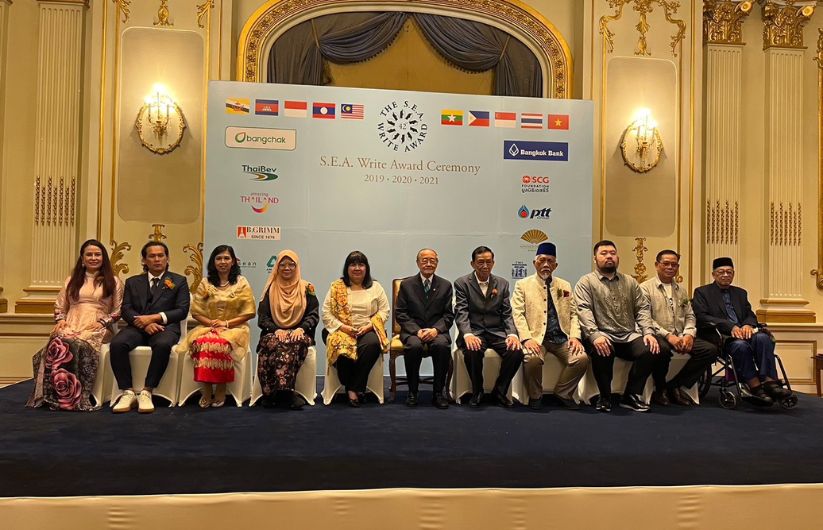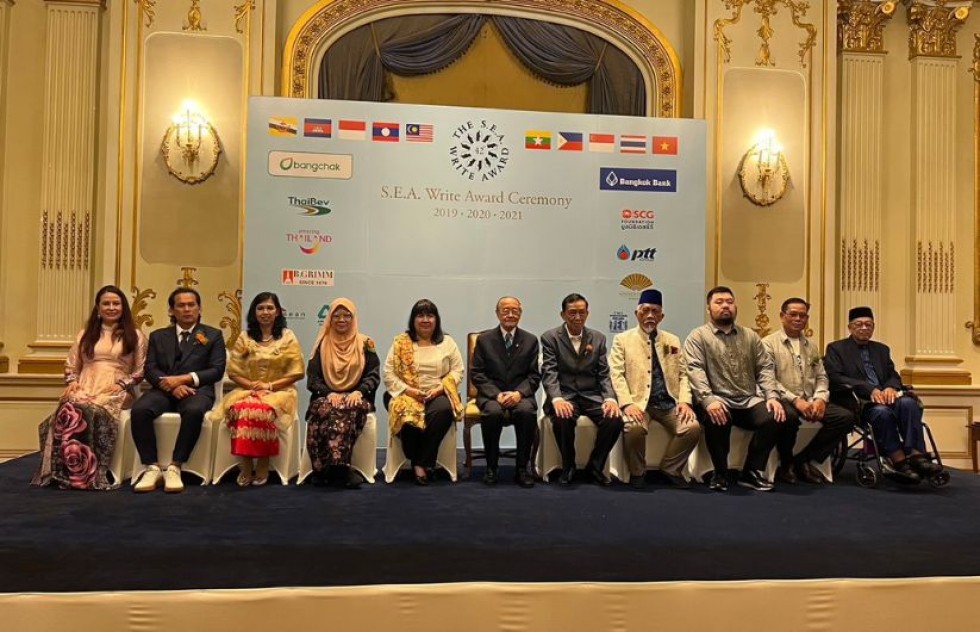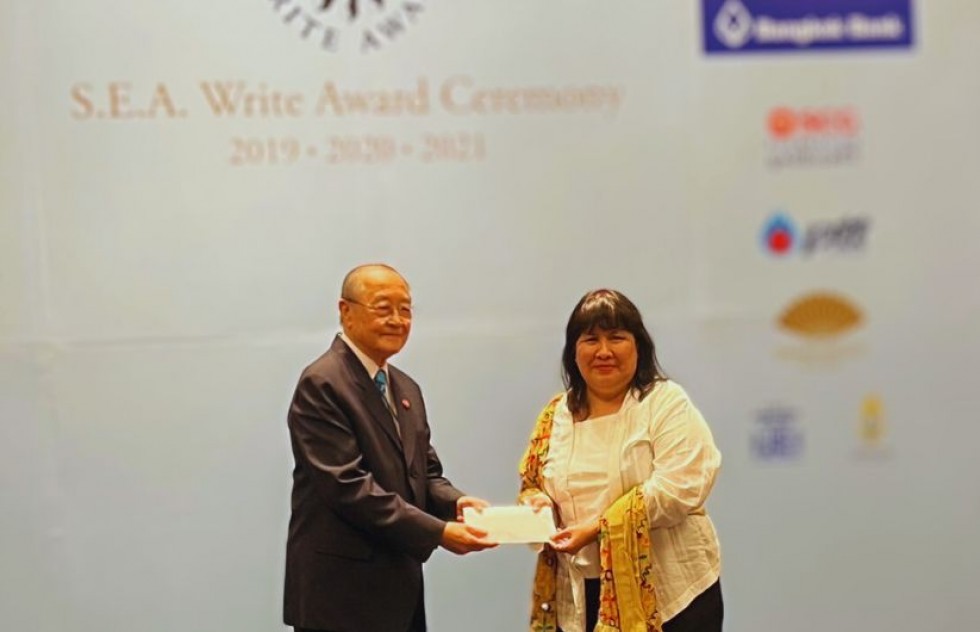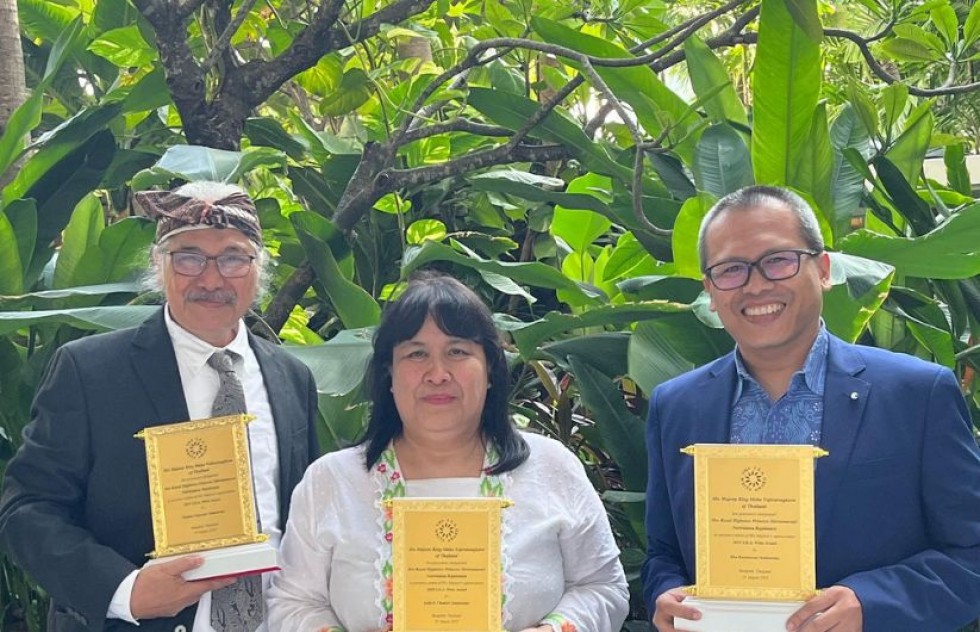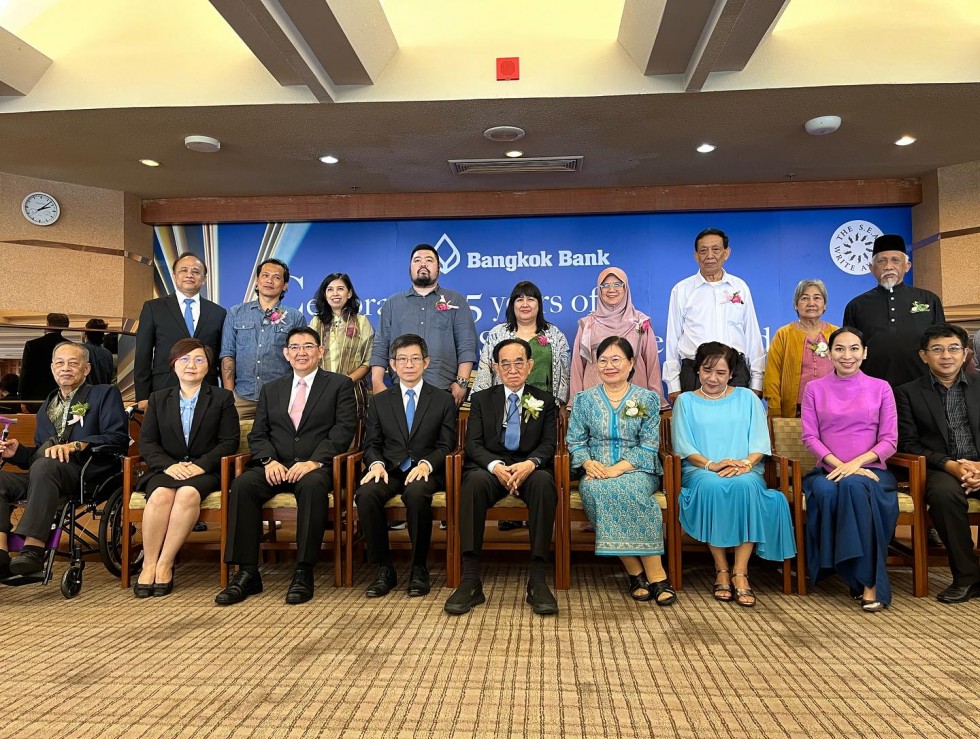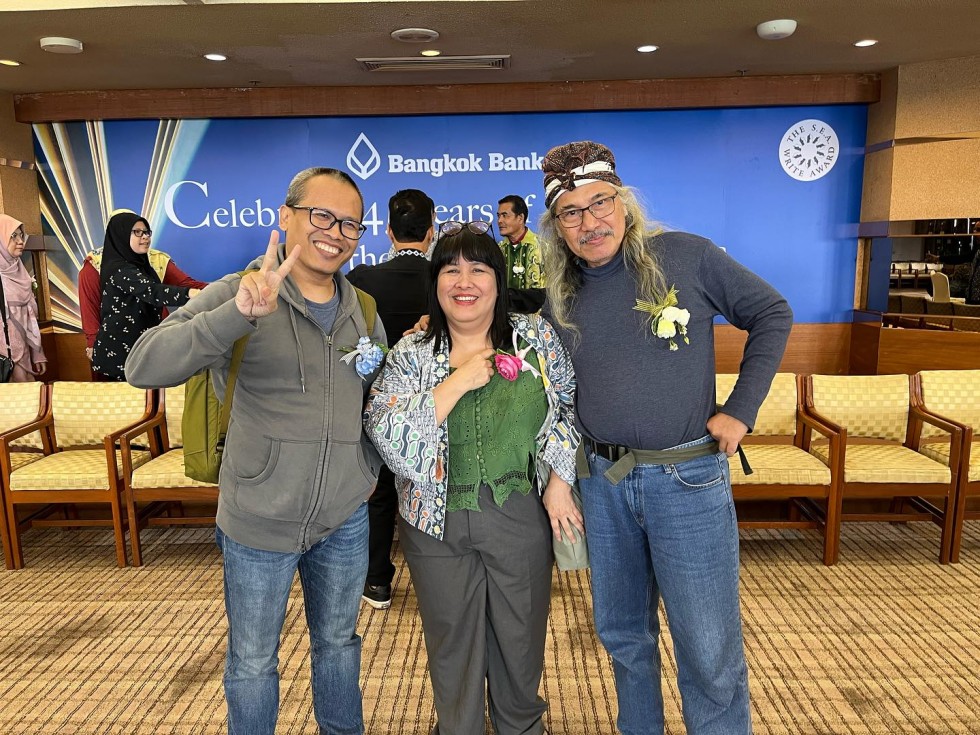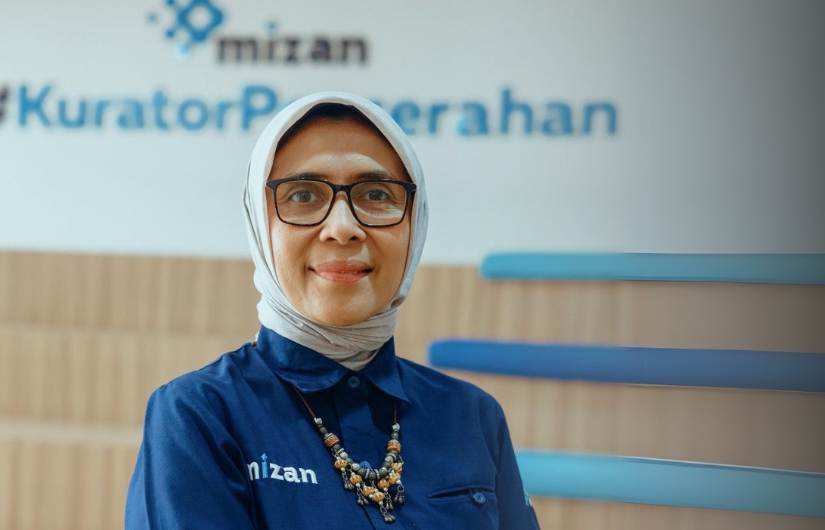The SEA Write Award, a prestigious accolade for literary excellence in the ASEAN region, has been awarded for 45 years, was just held for recognizing outstanding authors from Southeast Asia. Recently, Elite+ had the exclusive opportunity to sit down with Leila S. Chudori at the Mandarin Oriental Hotel Bangkok, as she becomes one of the recipient of the SEA Write Award in 2020 from Indonesia. The SEA Write was held for three consecutive years amid the pandemic: 2019, 2020, 2021. Two of the other resipient from Indonesia were Eka Kurniawan (2019) and Yanusa Nugroho (2021). In a candid interview conducted on the side-lines of the award ceremony, Leila shared Elite+ her thoughts, experiences, and insights on her journey as a writer, character development, ASEAN literary landscape, women writers, pen-to-screen tips and the significance of the award.
Leila's journey to receiving the SEA Write Award is marked by anticipation, jubilation, and a sense of responsibility. Having been aware of the award for decades and witnessing fellow authors claim the honour, Leila was happy when she was informed of her win. However, her elation was accompanied by the realization that the global pandemic would prevent her from attending the traditional ceremony. Despite this, the subsequent years saw a blend of online and physical celebrations, highlighting the award's enduring significance.
Congratulations on receiving the SEA Write Award 2020 from Indonesia. Can you share your initial thoughts and emotions upon hearing the news of your win?
Thank you. I had been aware of the SEA Write awards for a long time, witnessing many authors receiving it over the years. Sapardi got one. Sutardji got one. Budi Dharma got one. I just realized it’s been 45 years already. So it has been quite a long tradition. When the committee in Jakarta informed me about my win, I was delighted and very happy. However, as the news came amidst the pandemic, I knew I wouldn't be able to attend the award ceremony in person due to the lockdowns worldwide. So at that time we were celebrating this moment online, and at the ceremony I think our Ministry of Education, Nadiem Makarim was invited too. So we kind of had a semi formal online ceremony.
How do you perceive the way the judges of the SEA Write Award evaluate your prominent works like "Pulang" and "Laut Bercerita"? What's the significance of the award for ASEAN countries?
Honestly, most winners are not aware of the judges, and I believe it's better that way. I do not know their thoughts or identities, and I've intentionally chosen not to inquire. And at that time I was asked about my book called “9 dari Nadira” the book that they evaluate. Regarding the award's significance, there are limited awards for Indonesian and Asian literature compared to Western countries. The SEA Write Award fills that gap and brings attention to Asian literature. Thailand's support for the award through Bangkok Bank, ThaiBev and many other corporations for 45 years is impressive, a blend of literary and business worlds that isn't often seen, especially in our country, Indonesia.
Yeah. So I can't imagine that could happen in Indonesia. I've never heard any banks support literature in some ways like in Thailand. And I only know that, Indonesia usually have a Kusala Sastra Khatulistiwa, from what I know the biggest sponsorship was from Senayan Plaza and Mont Blanc. That's what I know. And then, there are other sponsorship from the media sometimes, but never become a sustainable thing in our country.
I think that the organizing committee, one that I know, Richard Oh (our beloved late Richard) who had struggled on the Kusala Sastra Khatulistiwa Award to be existed in Indonesia with such sponsors, and now that Richard has passed away, nobody is really continuing the journey of Kusala Sastra Khatulistiwa Award. Now in our country, the only award left is Penghargaan Sastra Badan Bahasa (Literary Award from the Government). We are lack of award like this. So, for me personally, to receive this award (SEA Write Award) is very special. This is special. Very special to me.
Leila's novels are often characterized by their intricate narrative threads and deeply resonant themes, often boast a colourful array of characters. When asked about her approach to character development, Leila's response reflects a nuanced perspective. She believes in the complexity of human nature and dislikes oversimplification. Drawing inspiration from her experiences as a journalist and film critic, Leila masterfully crafts characters that possess multidimensional qualities. An illustrative example is her novel called “Namaku Alam”, she told Elite+ spoilers about a character in the story that evolved. Leila's ability to imbue her characters with authentic traits results in compelling and relatable personas. So Elite+ also inquired some information about her work:
Now we talk a bit about your works so that our readers have a glimpse of your style in writing. Your work "Pulang" explores themes of identity and belonging. How do you approach character development, and are there characters holding a special place in your heart?
Hmm.. like fall in love? (giggles) (sigh) I wouldn’t say I fall in love because I really do not like it when people make a simplification of characters. But let me put it this way. I don't tend to categorize characters into simplistic labels like red flags, green flags, "good" or "bad." I don’t agree if humans can only be categorized in two colours. I think human beings have so many colors. If there is red, then there will always be the shades of red. No body is perfectly red or perfectly black in the sense that even if you are good person, there is going to be a lot of mistakes that you make. If you’re a bad person, maybe there are good things that you do too. Human beings are quite complex, and even seemingly negative traits can coexist with kindness.
So answering your question, while I usually have strict outlines, characters often develop beyond those plans. And a lot of time when these kinds of “grey characters” (the appearance might not be friendly but he’s trully kind at the end) popped up in my writings, I experience this when I wrote Namaku Alam, which is the sequel of Pulang, and this book is coming out this September.
So in that story, there is this guy. I’m writing him in the time when he’s in high school (middle high – senior high). And at the beginning when he knew Alam, he was really like, “so who are you, why are you here” you know, that kind of guy. I created this guy as a little bit jerk.. but not bad, he’s not unkind, he’s just a jerk! But apparently as the story unfolds, he has a very strong sense of brotherhood, because Alam was always bullied and attacked, he was just trying to protect. And Pulang was opened by the scenery where his father was arrested and become the political prisoner. And there is this guy called Kemal who really defend for him. So oh okay, I start to like him. I didn’t really plan it that way, I just… created him as someone who’s a jerk in the story, and someone who is on Alam’s nerve all the time. But I know, from the very beginning, I don’t want to make him as the bad guy. So I told him, okay I start to like you now. But at the beginning I just created him as a jerk. Now that I see his struggle, I changed my mind and therefore the whole story changes. Then I started to think that it’s going to be a lot more interesting if I make him into a good guy at the end. And for me, I wouldn’t say I fall in love to this character but seeing that the character has evolved is something interesting. It's intriguing how characters evolve organically through the process and you began to see something different on the character.
And my editor and director of the movie said "Ohhh… you know it’s so smart that we know at the end we like him". Yes, so sometime we do that. We didn’t plan the development of the characters to be this way. But apparently because you start to like him, and you start to see “Hmmm.. maybe I should do this to you?" (sigh) Without trying to make him as the main character you know, because the main character is still, Alam.
And I fell in love with this side character called Kemal. But Alam, as you can see, he’s always been quite dark from the very beginning. Dark in a sense that he’s traumatic. He has a lot of baggage in the past, baggage of terrors, baggage of bullies and he is really trying hard to control his emotion. The way he faced the bullies since he was a kid, was always with physical revenge. That’s why he was told to join karate. Because when you join this karate club, there is a swear, we called it “sumpah karate”, that you could not hurt anybody or harm anybody using your ability. That is why I began to understand “masculinity” in the sense that it’s often used to protect ourselves from external damage. A self defence mechanism. That’s when I have to also learn about the history of our martial arts in Indonesia.
Growing up in an environment steeped in journalism and literature, Leila's family nurtured her love for books, contributing to her fluency in storytelling. Her background allowed her to explore diverse narratives and perspectives, enriching her literary oeuvre. The familial influence and exposure to different forms of media have undoubtedly shaped her ability to create evocative narratives and thought-provoking characters.
Your career as a journalist and film critic surely influenced your writing. Could you elaborate on how these experiences impacted your fluency and versatility in writing?
Indeed, being surrounded by journalism from a young age shaped my approach to writing. My father was a journalist, and my mother, was a housewife who would put her most of the time reading books, she taught us to read. So her passion for literature played a role too. We were a simple family, not extremely rich or anything, but my parents always allocated funds for books. And then came the stage in my life, professionally, my involvement as a film critic at Tempo magazine offered insights into narratives and storytelling techniques. The combination of these experiences enriched my writing techniques and perspectives.
When did you start writing actually?
When I was, uh, long time ago, my first publication was in a magazine. Magazine called, if you search it on Google, it's called Si Kuncung, a very famous magazine at that time. So my first story was published when I was in the fifth grade, 12 years old. But then, then again, you have to remember, I started with children's stories and then it was when I was in high school, or the end of high school that I started writing romance (young adult) for Hai! magazine. At that time Hai! publication was also taken into account that when you were published by this magazine, people started to see you as a serious author. So that was the leap. It's a place where a bunch of writers get together, you know? And then, I was surrounded by a lot senior authors when I was young. I was hanging out a lot with Putu Wijaya, Sutardji Calzoum Bachri, Ikra Negara, so I got to know them. I started to writing for Horison (very notable literature magazine), and then when I went to Canada to continue my studies, I started to write more serious stuffs and shared my stories. So all my stories in my first antology was written during my studies.
So as you have an impressive career in literature. And you are still also as a mom of a writer as well in Indonesia, and how do you manage yourself, I know that you are a podcaster as well. How do you manage this all things together?
It's funny because after I retired from Tempo on December 12th. In Tempo we have to retire when we are 55. So I retired on December 12th, 2017, just at the same moment when my book “Laut Bercerita” was launched. Retirement is always on your birthday. I thought that I'm gonna have a better organization of time, because I don't work full time anymore! But apparently I became busier. I have a contract with Tempo, a show called Layar Bersama Leila S. Chudori, that's about film. And air in the YouTube. And then I also have podcast, with the Gramedia group. But at the moment, I have to pause it because I have to finish Namaku Alam. So now that it's done, I have to resume again. That’s my contract with KPG Publisher (Kepustakaan Populer Gramedia).
And besides those two, I have so many things going on. “Laut” (the short of Laut Bercerita or The Sea Speaks Its Name) was doing very well. We print all the time and now it's the 64th prints already. So several people (producers) offered us to make it into movies and I’m in the process of thinking and deciding. Actually, for Laut I have decided it's just that we just need to do the paperwork. But for Pulang I’m still thinking. I'm still thinking about what to do with the offer.
An integral part of Leila's literary journey is her association with Tempo, a pivotal juncture where she encountered untold stories suppressed during the New Order era. This period of introspection ignited a desire within her to unveil these stories, which eventually led to the birth of her impactful works like "Pulang" and "Laut Bercerita." Leila recognizes that while significant strides have been made in women's empowerment, there are persistent issues that demand exploration – from historical complexities to contemporary challenges.
What would you want to say for women out there, who are also writers or community of readers? Because I see that you are raising a very vibrant woman writer Rain Chudori, who has her own brand now, so what would you say to young women writers out there?
When I write, I kind of didn’t really specifically think of woman or man. But when I was studying in Canada, a lot of my short stories, um.. well I started to have that awareness of writing in gender perspective. You know when you study abroad and your eyes are open and you just go, oh my God, this is happening, you know? (giggles)
So, but I joined Tempo and then I start to get to know a lot of stories behind the news that we couldn't write because it was New Order. Then I thought, I really have to write this one day because I obviously, I don't think I could write Pulang or Laut Bercerita during that period of time in Indonesia. I don't think, (long sigh) so those things were born after reform.
You know, but I noticed, and people, some of the people who read my book always notice that even if my character is a man, is a guy, you know, like Laut and Pulang. And the women around them are always strong. You know, they're without these women, either the mother or the sister or the girlfriend or the. Like for Laut there are three women who are really, really strong around him. The head of the organization in my story is a woman, and also her sister. And also his girlfriend. They're all really strong women. I remember Melanie Budianta wrote for that when we were in a discussion and she specifically wrote about these women.
And I know I purposely did that. So maybe if you ask me to inspire, I don't know whether I can be inspirational enough or not, but I think what I could say that there's a lot of things that you can write on women's issue or what's happening with Indonesian women from a very long time ago, since centuries ago until now. Some of things, sure It's improving, some of things are still the same. So you can find from smallest things until really huge issues, but you have to remember, it is to anybody not only women writers, that at the end of the day, theme is a choice. And it's the way you write is the most important thing. Like you have, you can have a very big theme, like a really huge theme. For example, a friend of mine said, oh, I want to write about 1998, what happened to the Chinese minority in Indonesia? And I said, very good. Not many people has written that, but the important thing is not about the big thing that draws attention, not because that's really huge (phenomenon in Indonesia). The important thing is, how you’re going to break down this huge theme. This historical complexities that came along with it. And then how you break it down to one character. And you have to make it really interesting. At the same time, you have to write it well and you have to present it very well.
So I think, at the end of the day, it's not about the theme, but it's about how you write. Now what I'm going to ask or suggest is about how to drill your skill. I always keep telling people who join my class, that you don't have to have a fancy class or whatever, just keep writing a diary, but serious writing. Not like, ‘uh.. I saw this guy today and bla.. bla..” write it like a serious writing. You know, make a prompt and write something really serious because when you start writing a chat, you are going to exercise of your skill. And then I can give you an example, like even Eka Kurniawan (SEA Awardee 2019 from Indonesia) still have a blog. Even Goenawan Mohamad (founder of Tempo and a prominent figure in Indonesian literature), he kept writing Catatan Pinggir essays every week. Well, now he's retired, but you know for what, for 50 years? Then we asked him, why are you still writing Catatan Pinggir? He said “Because I need to practice every day. If I don’t write it every week, my skill is going to disappear.” Just like me. If I don’t write for three weeks and I start writing again, I felt like OMG, I forgot how to write already. So that's what they need to do. Writing is a never ending practice and practice.
See, so you don't really need all these fancy things and just write diaries and then you may start a blog. Because it’s a blog, it means that you start having readers. And then you start writing for internal magazine maybe, or high school magazine and then you start writing for a more bigger media.
While the solitary nature of novel writing may contrast with the collaborative nature of filmmaking, Leila's seamless transition stems from her familiarity with group work. Having been part of previous creative projects, such as the drama "Dunia Tanpa Koma," she is well-acquainted with the dynamics of shared creative endeavors. The synergy she cultivated at Tempo serves as a valuable foundation for embracing the collective process of translating her literary works onto the cinematic canvas.
Let’s talk about your books become movies. How do you manage to cope with this shifting of role, before you are fully authoritative because it’s your novel, and then see that your work becoming somebody else’s work, and then as a film critic who has actively written about films you start seeing your story as a film, how do you cope with your own ego?
I think working in Tempo has taught me to be in a group. Because in Tempo we have what we call total football. Like you cannot just write alone. You have to be in a group. Like when you're writing a, a cover story, there's no way I am doing it alone. It has to be like with six other people, with six other reporters, and when I interview someone and other one, and then we have to get it together. And then someone write, someone edits, someone criticize the writing. So I'm kind of used to that. If I didn't join Tempo, maybe it'll be more difficult. So in Tempo there's no individual ego. You can't, like, there's no way that you are doing your solo thing. So in film it's the same thing. It's a group thing. Of course there's a director. And I am very well aware that. So this is not the first time, because I did a drama before, it's called Dunia Tanpa Koma, the director was Maruli. I was the script writer, I was the one who initiated. I suggested this kind of story, and then I wrote the whole 14 episodes of the drama. And then Maruli was the one who make it as a serial. Of course, he had to ask me a lot of things because it's about journalists, right? So he said, how is the situation when you have meetings?" Because when he reads it, it seems like it's so democratic. And I said, oh yeah, because the model I was using is in Tempo, right? Yea in Tempo we are like that. And he said I've never experienced this kind of meeting, you know, so, can I go and or sit down? And I said, sure.
He came to Tempo with Fauzi Baadilla (the actor) and Dian Sastrowardoyo (the actress, main character of the movie), they came to study how’s the journalists talk, how’s the journalists when they interview. She also came to see how the police work because there's a lot of crime stories, and it's a story of journalists who cover crime story. So to put it firmly, it's not actually the first time for me to work in a group. But I understand your question because writing a novel is a solid, solitary thing. So for me, when I decided that, "yes, I'm going to give this to you, I'll sell my rights to you" I have to make sure like I'm choosing a partner for marriage, you know, I have to be very comfortable with them and they have to be very comfortable with me. I kept answering that when journalists asked me like, "why dont you accept the offer?" And I said, this is like choosing a husband or choosing a partner. It's not just one or two dates. It's like, really, you know, you cannot just ask what do you like to eat for this matter. You have to know their habits. Their ingredients. And also if, if they face crisis, what are they going to do about it? Are they going to be hysterical or are they going to be okay? Because my stories are quite sensitive. It's a sensitive story. Both Laut and Pulang are sensitive.
But apparently these two stories are what the producers like! Because Nadira is, to me, Nadira is also a interesting story for me. It's (addressing) mental health. Someone commit suicide, but I don't know, people like Laut and Pulang more. Oh. But anyway. It took a long time for me to decide about Laut because it's so many offers. So when they asked me I said, okay, let's see. I really think choosing who you work with is like marriage.
Now, Back to SEA Write Award, as closing statement, what do you want to say to Thai or ASEAN society, particularly those who are reading literature and books?
To Thai people? (sigh) Okay for ASEAN. Well, I think I talked to Eka Kurniawan earlier today and when we just, uh, we went to the palace to receive the token of appreciation from the Kingdom of Thailand. We were amazed that Thailand can maintain this tradition for 45 years, and I wish, I personally wish that other countries can do that too, including Indonesia, Singapore, Vietnam, the Philippines. If we want to open it more to Asia, my God, bigger you know, it would be great because, literature has always been dominated by Western taste. I'm sure can tell you that. My work, when I was translated. It's always... there's always a question like this, "okay, because the readers are going to be English speakers so we're gonna have to explain what Becak is" so we have to explain it in longer term what Becak is. Becak comma, blah blah, you know, whereas in the original we don't have that. And I really would love to have Asian contribution, not only India, I mean, Indian writers are doing very well in literature because they write in English. A lot of them write in English, right? But other than Indian, you know, now Srilanka, Srilankan writers also doing well because they just won Booker prize, to mention it, Shehan (Karunatilaka), we are going be in one panel in Ubud by the way, (giggles) I'm thinking about other Asian countries, like us, other than Japan, obviously. So, I'm very glad and I personally think that Thai people should be proud they do have this award and all writers who came here get to know about Thailand very well. And I'm also hoping that, this kind of award will still be an inspiration to other countries. That's my last.
Leila's vision extends to fostering literary excellence beyond established literary powerhouses. She envisions a future where countries across Asia, not just India and Japan, garner international recognition for their literary achievements. The recent triumph of Sri Lankan writers at the Booker Prize exemplifies the growing diversity of voices in global literature, and Leila's aspiration is for this trend to further encompass the rich tapestry of stories from throughout the ASEAN region.
In this spirit, the SEA Write Award stands not only as a celebration of literary achievement but also as a catalyst for promoting cultural exchange, understanding, and appreciation in ASEAN. Leila S Chudori's closing remarks resonate as a lasting echo, inviting Thai people and the wider ASEAN community to take pride in this literary heritage, while inspiring a collective drive toward enriching the global literary landscape. As the pages of each awarded work turn, they unfold new narratives. And it is 45 years now, is still counting, with different faces and different names.


